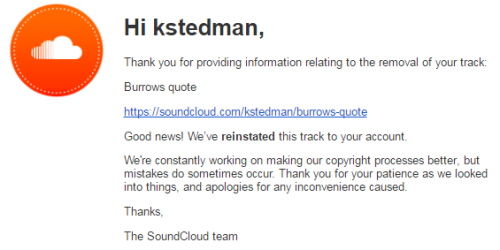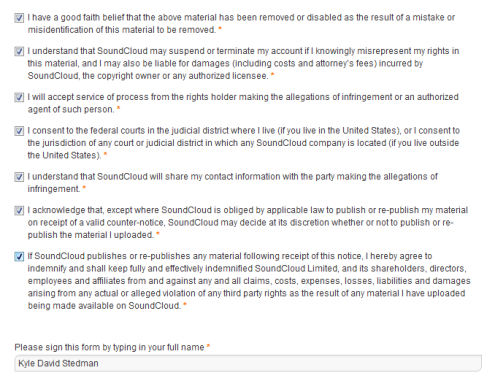Hoo boy. A few years back, I successfully disputed a file I legally uploaded to Soundcloud as part of my dissertation. And now, a file I uploaded around the same time is suddenly under investigation as well.
Here’s the short version: for the diss, I was reading a lot of David Burrows, my favorite music philosopher, and I wanted to explore a quote of his in a brief audio experiment. He writes, “Seeing is like touching, hearing like being touched” (Sound, Speech, and Music 21). So (according to my memory, which is a little awkward because I can’t actually listen to the file I’m describing, and I haven’t for a few years) I recorded myself reading Burrows over and over, with various effects and musical elements added and removed to enact the ideas I was writing about those days: the ways music and sound’s meanings are embodied in the complete context of their delivery and in the experience of the listener. It was a way to put into practice my scholarship. It’s nothing fancy, just a playful file–but of course, when you’re doing scholarship on sound, it’s not just play; it’s play toward a critical end.
But now, Soundcloud’s auto-search algorithms say I don’t have the right to use one of the short clips (“short” = less than 10 seconds, if my memory is right) I used: a piece from Bela Fleck’s collaboration with Luo Cultural Association, an African group he recorded and toured with. (I bought the CD at a concert in Orlando, had them sign it and everything.)
Of course, it’s worth pointing out that Soundcloud has no problem with my use of the written Burrows quote, because the way we talk about and police short clips of writing is completely different from the way we talk about and police short clips of music. Sigh.
So I disputed the copyright claim, after being annoyed at how little respect their system seems to give fair use:
After I clicked “some other reason,” Soundcloud gave a big list of things that it warned me wouldn’t be good enough answers–things like “I only used a small amount” or “I own the CD” (those aren’t actual quotes; I don’t have the page open anymore). The thing is, a lot of the things on its list are things that actually could help a fair use case, even if you acknowledge that they’re not sufficient defenses on their own.
Here’s where Soundcloud and I agree: people really misunderstand the nature of fair use. I mean, that list could be useful for people who really think that having a single factor in their favor is good enough. But here’s where we differ: I think that walking people through real-world cases (say, when their upload is contested) is a way to teach them the way fair use actually works. I think that list could/should be given in the context of a fair use checklist, or links to successful fair use defenses people have used in the past, or even a short video on this stuff.
Soundcloud disagrees / doesn’t have time / isn’t interested / whatever.
So I disputed claim. Here’s what I wrote, for the record:
I believe my use of this clip falls under fair use. I’ll walk through the 4 factors using the checklist at the Columbia Universities Libraries (https://copyright.columbia.edu/basics/fair-use/fair-use-checklist.html#Fair Use Checklist), after providing a short background.
BACKGROUND
I’m a scholar of rhetoric and writing who studies remix, copyright, and music. (I’m happy to provide citations, if you’d like to see them.) The upload in question came from a time when I was reading music philosopher David Burrows’ work and writing about the ways music and sound affect humans in different ways depending on the context. But because of the nature of my work, it was important for my listeners to actually *hear* the effects I was discussing, not just read about them. That purpose leads directly to the first of the four factors:PURPOSE
My use of the copyrighted clip was to help me and others explore this scholarly, critical concept (the question of how music is or isn’t “like being touched,” in Burrows’ words, especially when the background music and vocal delivery changes). I therefore believe my use of the copyrighted work counts as transformative under U.S. copyright law: I took music that was designed for entertainment purposes and digitally altered part of it, transforming it for a scholarly, critical purpose. This factor weighs in my favor.NATURE
It’s true that the copyrighted work I used to help make my point was “highly creative work” (in the words of the fair use checklist I’m using). This factor weighs against me.AMOUNT
Despite Soundcloud’s point that using a small amount of a copyrighted work doesn’t make the use more likely to be fair, “amount” is in fact one of the four fair use factors. (Yes, I know that people have been found liable for using very short amounts of music–but it’s still one of the four factors.) In this case, I used a very small amount of the copyrighted song. I don’t have a copy of my uploaded file on this computer, but I believe I used fewer than ten seconds of the song in question–not that ten seconds is a magic bullet, but that it’s a very small percentage of the overall song. This factor weighs in my favor.EFFECT
Following the fair use checklist, I see aspects of this factor that fall on both sides. On one hand, I did make this (very short) clip (with talking over much of it) available publicly on Soundcloud, which seems to hurt my case. But on the other hand, I’m using a clip that I legally own on CD (bought at a concert, actually)in a way that could not possibly have a negative effect on sales of this album. My belief is that this factor leans more in my favor than against it–after all, who could claim that someone would hear this clip and then be less likely to buy a copy? It seems more likely that the opposite would happen: the listener would think, “Ooh, that tiny bit was cool! I want to hear the whole thing whenever I want!”CONCLUSION
Though the four factors aren’t always weighed completely equally by judges, it’s common for fair use cases that actually go to court to decide in favor of the side that has the majority of the four factors in their favor. (See the cases listed by the federal government at http://www.copyright.gov/fair-use/fair-index.html for examples of many music cases.) Therefore, since three of the four factors weigh in my favor, I believe I have a genuine fair use to use this work in my piece.(And if you don’t mind my saying so, I believe that any human would agree with my judgment. This casts some doubt on the ability of Soundcloud’s auto-search algorithm to adequately understand the complexities of fair use. And that, in my mind, will lead to a chilling effect on thousands of today’s creative minds, who will opt to compose safely instead of learning about the reality of fair use law. It’s disappointing to me that a platform as revolutionary as Soundcloud would participate in that cultural silencing.)
UPDATE (5/26/16): They agreed. That’s nice!








